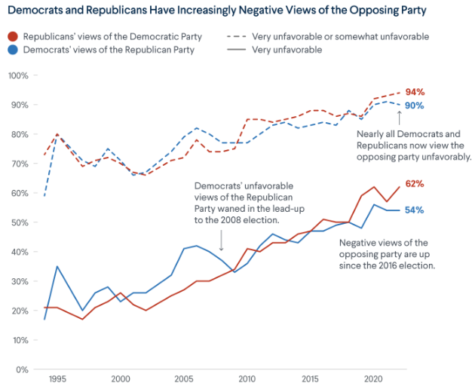TEA: Trump’s Endangered Administration
January 29, 2020
By Abby Hendrickson
Before I dive into a political analysis of the complicated, confusing conflicts occurring today in American politics, I find it equally important to provide some background information for those who may need a slight refresher on their civics.
Impeachment is a power included in checks and balances that serves as the ultimate check on the chief executive. I have observed the common mistaken belief that impeachment is literally the direct removal of the president from office; consequently, people are citing these fallacies with little understanding of how complex the process truly is.
In reality, the term impeachment actually refers to the filing of formal charges. The power of Congress to remove a president from office is cited directly in the Constitution, and due to it being such a momentous act, it is not easy to act upon. The political process of the removal begins if the House of Representatives formally impeaches an official (in this case a president). Then, the Senate holds a trial reviewing the official charges in which they decide whether the official may continue holding their position in federal office.
The U.S. Constitution states that the President of the United States may be impeached if he is found guilty of “treason, bribery, or other high crimes and misdemeanors.” However, Congress has recognized more specific situations that are viable for impeachment such as “misusing an office for financial gain…,abusing the powers of the office, or for acting in a manner considered incompatible with the office” (NBC News).
Now for a brief history lesson: No president in American history has been removed from office through the charges of impeachment. Three presidents have been impeached (Andrew Johnson, Richard Nixon, and Bill Clinton) with only one leaving office, on his own accord. Richard Nixon resigned in 1974, after the Senate judiciary committee approved three articles of impeachment (before the entire floor could vote him out). He undoubtedly would have been removed from office had he not resigned, but technically, no president has been forcibly removed from office through grounds of impeachment.
Now for today’s current situation. Donald Trump, America’s 45th President, has been impeached by the House of Representatives. The original articles of impeachment passed by the House of Representative will now be individually voted on by the Senate. The first is Article I: Abuse of Power, and the Democrats used his solicitation of the Ukrainian government to “publicly announce investigations that would benefit his reelection” (CNN). In doing so, it became almost indisputable that Trump’s actions betrayed the trust of the American people for his own personal political benefit. The second is Article II: Obstruction of Congress. Trump has publicly denied and encouraged those affiliated with him to deny subpoenas from Congress. It is illegal to deny subpoenas for an investigation being conducted by the U.S. Congress, and yet, Trump has done it multiple times.
Mitch McConnell, the current Senate Majority Leader, is refusing to consider the witnesses that the Democrats want to call upon until they have opening presentations. Chuck Schumer, the Democratic Senate Leader, claims that this is a trap. He, as well as many other Democrats, share the rational fear that McConnell will dissolve the trial and deny witnesses as soon as they are submitted for the proceedings.
If the House does not get a commitment from the Senate Republicans saying House managers may call upon witnesses for the trial, then the “Senate will act as little more than a nationally televised meeting of the ‘Mock Trial Club” (according to Schumer). So, the proceedings are at a stalemate, as there is a ton of secrecy over Trump’s actions. The Senate is making attempts to coverup his actions by refusing to hear witnesses that could produce undeniable evidence, and the Democrats do not want to give up their sources if its just going to be immediately dismissed.
It is my personal opinion that this entire situation is embarrassing for the government. The representatives have a duty to their constituents to make decisions in their interest, but in past years, it has transformed into an insanely polarized political environment. Instead of being able to agree on basic things (such as Trump’s relations with foreign countries are highly illegal and dangerous for the country), it has transformed into a competition of political parties.
This is extraordinarily disheartening as progress is hindered by this blatant self-inflation and prioritization of these political parties.
In total dismay and upset, I make the prediction that Trump’s trial will never be conducted at the level of severity that is required by this situation. The Republicans have a 53-seat majority in the Senate, and 51 votes are necessary to pass a set of rules for Trump’s trial (Reuters). If the trial is ever fully established, then I am almost positive he will not be voted guilty on the articles of impeachment and will remain in office.
I want to end this report by saying that the morals in this situation have been totally disregarded, and it leaves me enormously concerned for America’s future. My generation, that is gaining voting power now, hopefully will help counteract these issues and bring about change. I believe our country is better than the way we are currently acting in both our national and global community, and I urge every single person to vote and become politically involved (regardless of your political identity).
Works Cited:
https://www.nbcnews.com/politics/congress/what-impeachment-how-does-it-work-10-facts-know-n1072451
https://www.cnn.com/interactive/2019/12/politics/impeachment-articles-annotated/







